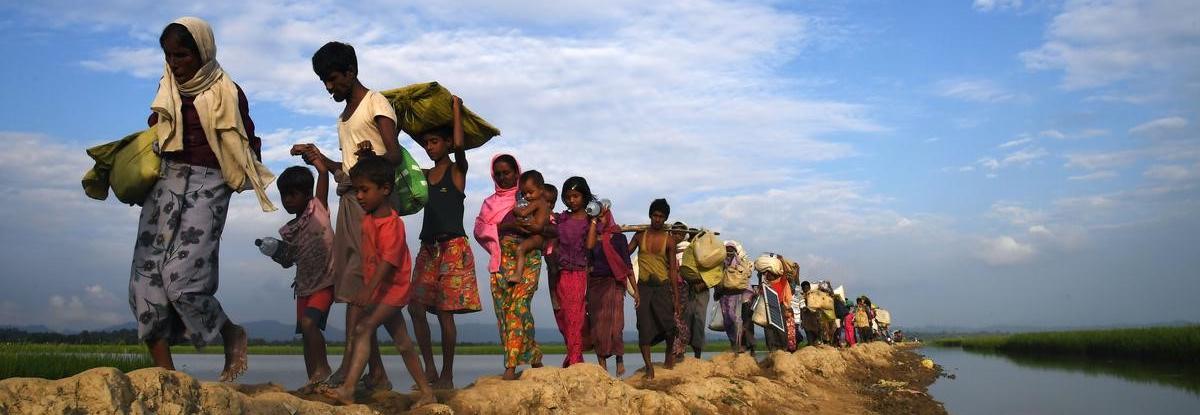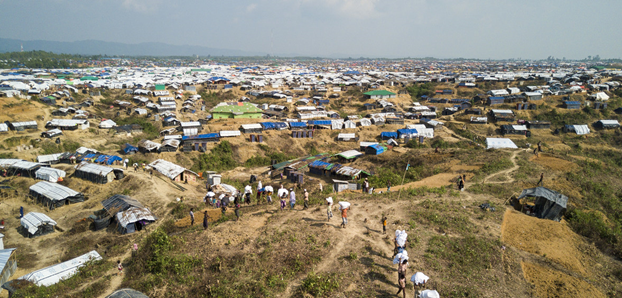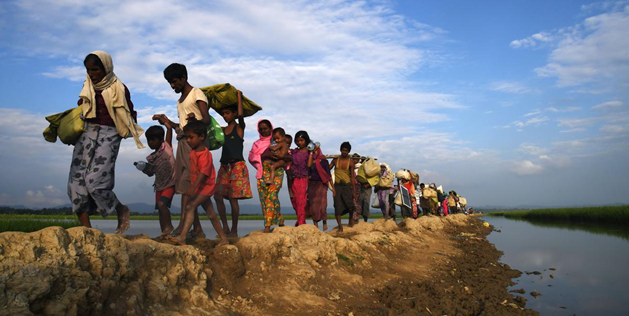An overview on Rohingya Refugees Crises Perspective of Bangladesh
About one million Rohingya have been expelled from Myanmar and spread to neighbour states Bangladesh, Thailand, Malaysia, and other countries in the Middle East. Not a solitary Rohingya has had the option to re-visitation of Rakhine State as Myanmar has not established a favourable climate for repatriation.

The Rohingya are a people living in the northern part of the Rakhine State in western Myanmar. Most of them are Muslims. About one-third of the Rakhine state is Rohingya. About two million in number. As a result of the communal attacks of Myanmar's military and extremist Rakhine, about one million Rohingya have been expelled from Myanmar and spread to neighbour states Bangladesh, Thailand, Malaysia, and other countries in the Middle East.

UN agencies helping Rohingya refugees in Bangladesh
In 2017, Myanmar's military launched a major offensive in villages in the northern Rakhine state. In the initial operation, dozens of people were killed and many arrested. As the operation continued, the number of casualties continued to rise. Arbitrary arrests, extrajudicial killings, gang rapes, atrocities against civilians, and looting were carried out. According to media reports, hundreds of Rohingya were killed in December 2017 and many have fled Myanmar to seek refuge in areas around Bangladesh. During an incident in November 2017, Myanmar's military used "attack helicopters" to shoot and kill villagers. According to those who have fled Myanmar, women have been gang-raped, men have been killed, homes have been set on fire and children have been thrown into burning homes. Myanmar's military often fires on boats carrying Rohingya refugees in the Naf River. Satellite images released by Human Rights Watch show that about 1,250 Rohingya homes have been set on fire by security forces.

Rohingya refugees have been coming from Myanmar to Bangladesh by crossing the border in 2017
Most of the Rohingya have gotten away to Bangladesh, where there is two official, enrolled refugee camps. As of late savagery in Myanmar has raised, so the quantity of refugees in Bangladesh has expanded quickly. “As indicated by the UN Refugee Agency (UNHCR), more than 723,000 Rohingya have fled to Bangladesh since 25 August 2017”
International Communities Responsibility:
Not a solitary Rohingya has had the option to re-visitation of Rakhine State as Myanmar has not established a favourable climate for repatriation. The issue of pressure on Myanmar to create a conducive environment in Rakhine State for the repatriation of Rohingya is being discussed again in the international arena. Simultaneously, the preliminary of Myanmar's military authorities blamed for Rohingya outrages has remerged. These issues have come up in the virtual conversations of the agents of various nations and alliances at the International Donors Conference to give helpful help to the Rohingya. Worldwide alliances accept that repatriation is the way into the Rohingya issue. So we need to accentuate this issue. Be that as it may, the continuous clash in Rakhine has made new vulnerabilities over repatriation. Prior, over the most recent three years, not a solitary Rohingya has had the option to re-visitation of Rakhine State as Myanmar has not established a helpful climate for repatriation. "The conference is facilitated by the US, the UK, the European Union (EU), and the United Nations High Commissioner for Refugees (UNHCR). The conference was organized due to the international humanitarian assistance for the Rohingya, which is due to the funding crisis in the Joint Response Program (JRP). This year, the JRP has pledged 1000.6 million US dollars, but so far only 5.1 million US dollars have arrived. Bangladesh's role in providing shelter to the Rohingya has been praised despite various limitations.
At the initial meeting of the conference, US Deputy Secretary of State Stephen Beagan stated, we have to try harder to locate an honourable answer for the Rohingya issue. Myanmar must take responsibility for the voluntary, safe, and dignified repatriation of Rohingya. The root cause of the conflict in Rakhine needs to be identified. Those liable for the outrages against the Rohingya must be considered responsible. The Security Council has a unique obligation in such a manner.
Ruler Tarek Ahmed, the UK's Minister of State for Foreign Affairs for South Asia and the Commonwealth, said at the conference that the Rohingya issue was not the obligation of just a few. "A regional solution is needed," he said. We have to stand by those who have given shelter to the Rohingyas, including Bangladesh, for a sustainable solution.
UNHCR High Commissioner Filippo Grandi said Myanmar had the primary responsibility for Rohingya repatriation. The contention between the Arakan Army and the Myanmar armed force in Rakhine is making another crisis regarding repatriation. If the Rohingya do not have confidence in the Rakhine environment, they will not be eager to return. At the same time, they have a roadmap to get back their basic rights including citizenship. For this, accentuation ought to be laid on the usage of the suggestions of the Coffee Annan Commission. The donors' conference pledged about 800 million US dollars in new aid to the Rohingya this year. The United States has pledged 200 million US dollars, the EU is about 113 million US dollars, the UK is 63 million US dollars. Filippo Grandi said a total of 597 million US dollars had been pledged. This mirrors the solid help of the global communities in giving philanthropic help to the Rohingya”
State Minister for Foreign Affairs spoke at the second session of the conference, Shahryar Alam. He later told reporters at his office at the foreign ministry in Dhaka that Bangladesh had been able to deliver the message it needed to deliver after three years of sheltering the Rohingya. Bangladesh knows what is happening to the country for sheltering the Rohingyas, what risks may be created for the future. It has been highlighted at the conference.
The Bangladesh state minister for foreign affairs said work had begun on fencing the Rohingya camp in Cox's Bazar in the interest of security. 0.1 million Rohingyas will be relocated to Bhasanchar city. He said Bangladesh feels that the UN is not putting enough pressure on Myanmar and is not taking enough action to put pressure. The United Nations needs to assume a more grounded role.
References
Diplomatic reporter. (2020). The main solution to the Rohingya problem is repatriation. Dhaka: Pothom-Alo newspaper.
Kamruzzaman, M. (2019). Bangladesh alone can’t solve the Rohingya problem: the UN. Dhaka: AA.com.
PENNINGTON, M. (2018). Bangladesh points finger at Myanmar for Rohingya 'genocide'. New York: FOX NEWS CHANNEL.
UN Affairs. (2020). Bangladesh urges greater international action on Rohingya status. UN News.
WAM. (2017). We must resolve to aid all refugees. Emirates247.